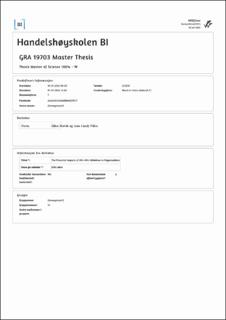| dc.description.abstract | Prosocial behaviour is important because we get a better understanding of why people behave the way they do, especially when doing acts that favour others. If we want others to act kindly to us, we should also show the same behaviour towards them. It goes both ways. Researchers have investigated the norm that one should give without expecting to receive something in return (Makov & Newman, 2016). However, the setting changes when there is a benefit to gain from doing a good deed. Makov and Newman (2016) indicated that when there is an initiative with a win-win motive, people tend to rate it more negatively than an initiative with a “pure” altruistic motive.
In this thesis, we aimed to investigate whether a prosocial benefit would affect employees’ opinions of organisational charity. Our hypothesis examined employees’ satisfaction with their employer if the organisation donated to a fictional charitable foundation with or without receiving a benefit. We used a fictional foundation to reduce respondents’ strong thoughts and connections to other established organisations. By doing this, we could receive honest and real opinions from the respondents. Our experimental study was based on two conditions: an altruistic- and a win-win situation, with various control variables. There were 148 participants in Norway who partook in the study and were evenly divided and assigned to one of the two conditions. Even though our study found no statistical significance, we could at least suggest that employees are not more positive about initiatives with a profit in win-win situations. Future research should investigate why and under what circumstances people respond more negatively to win-win initiatives. | en_US |


